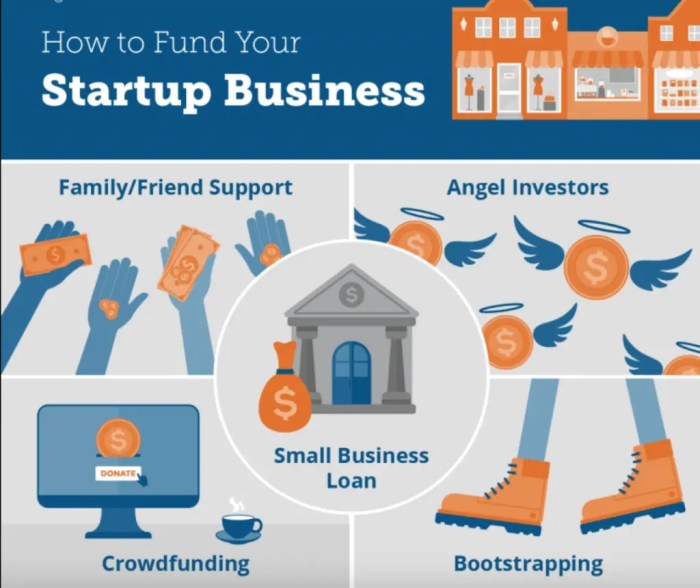Start-up loan programs provide a vital lifeline for aspiring entrepreneurs, offering the necessary financial support to kickstart their business dreams. From defining what these programs entail to exploring the various types available, this guide delves into the intricate world of start-up loans, shedding light on eligibility criteria, application processes, funding, and repayment options.
What is a Start-up Loan Program?
A start-up loan program is a specialized financial assistance initiative designed to provide funding support to entrepreneurs who are in the early stages of launching a new business or venture. These programs are aimed at helping individuals overcome the initial financial barriers and challenges associated with starting a business.
Are you looking for funding to kickstart your new business? Check out these new business loans that can provide the financial support you need to get your venture off the ground.
The primary purpose of start-up loan programs is to offer entrepreneurs access to the capital they need to cover essential expenses such as equipment purchases, inventory, marketing, and operational costs. By providing financial support, these programs enable aspiring business owners to turn their innovative ideas into viable and sustainable enterprises.
How do Start-up Loan Programs Differ from Traditional Business Loans?
Start-up loan programs differ from traditional business loans in several key ways:
- Flexible Eligibility Criteria: Start-up loan programs often have more lenient eligibility requirements compared to traditional lenders, making it easier for new entrepreneurs to qualify for funding.
- Lower Interest Rates: Start-up loan programs may offer lower interest rates or favorable repayment terms to support the growth and success of new businesses.
- Mentorship and Support: Some start-up loan programs provide additional resources such as mentorship, training, and networking opportunities to help entrepreneurs navigate the challenges of starting a business.
- Risk Mitigation: Start-up loan programs may be more willing to take on higher risks associated with new businesses, providing funding to innovative ideas that traditional lenders may deem too risky.
Types of Start-up Loan Programs
Starting a business often requires financial support, and start-up loan programs can help entrepreneurs access the necessary funds to launch their ventures. These programs come in various forms, each catering to different needs and circumstances. Let’s explore the different types of start-up loan programs available and how they can benefit aspiring business owners.
Government-backed Start-up Loan Programs
Government-backed start-up loan programs are initiatives supported by federal, state, or local governments to provide funding to new businesses. These programs often offer lower interest rates and more flexible terms compared to private loans. One prominent example is the Small Business Administration (SBA) loan program in the United States, which guarantees loans issued by participating lenders to small businesses. These government-backed programs aim to stimulate economic growth and job creation by supporting entrepreneurs who may not qualify for traditional bank loans.
Private Start-up Loan Programs
Private start-up loan programs are offered by financial institutions, online lenders, and private investors. These loans may have higher interest rates and stricter eligibility criteria than government-backed programs but can provide faster access to funding. Private start-up loan programs are often tailored to specific industries or business models, such as tech start-ups or social enterprises. Companies like Kiva and Accion offer microloans and peer-to-peer lending options for entrepreneurs who may not qualify for traditional bank loans.
Examples of Successful Start-up Loan Programs
One successful start-up loan program is the Start-Up Loans scheme in the United Kingdom, which provides low-interest loans and mentoring support to young entrepreneurs. Since its launch in 2012, the program has helped thousands of businesses get off the ground and create jobs in various industries. Another example is the Opportunity Fund in the United States, which offers microloans and financial coaching to underserved communities. These programs have had a significant impact on small businesses by providing them with the necessary resources to succeed.
Eligibility Criteria
When applying for a start-up loan program, there are certain eligibility criteria that applicants must meet in order to qualify for funding. These criteria are put in place to assess the risk associated with lending money to start-up businesses and to ensure that the funds are used responsibly.
Common Eligibility Requirements
- Applicants must be at least 18 years old.
- Applicants must be legal residents of the country where the loan program is offered.
- Applicants must have a solid business plan that demonstrates the viability of their business idea.
- Applicants must meet any minimum revenue or income requirements set by the loan program.
Credit Scores and Financial History
One of the key factors that lenders consider when determining eligibility for a start-up loan program is the applicant’s credit score and financial history. A good credit score demonstrates a history of responsible financial management and reduces the risk for lenders. Additionally, a positive financial history, including timely bill payments and low levels of debt, can further strengthen an applicant’s eligibility.
If you’re a startup in need of funding but don’t have collateral to offer, don’t worry! There are options available such as no-collateral startup loans that can help you get the necessary capital without putting your assets at risk.
Importance of a Solid Business Plan
A well-thought-out and comprehensive business plan is essential for meeting eligibility criteria for a start-up loan program. Lenders use the business plan to assess the feasibility of the business idea, the potential for success, and the ability of the applicant to repay the loan. A solid business plan should include detailed financial projections, market analysis, and a clear Artikel of the business’s operations and goals.
Application Process

When applying for a start-up loan program, it is essential to follow a structured process to increase your chances of approval. Here are the steps involved in applying for a start-up loan program, along with tips for completing a successful loan application and the documentation typically required during the process.
Step 1: Research and Preparation
- Research different start-up loan programs to find one that suits your needs and eligibility.
- Prepare a detailed business plan outlining your business idea, target market, financial projections, and repayment strategy.
- Ensure your personal and business credit scores are in good standing.
Step 2: Application Submission
- Complete the loan application form accurately and provide all required information.
- Double-check the application for any errors or missing details before submission.
- Submit the application along with the necessary documentation.
Step 3: Review and Approval, Start-up loan program
- Wait for the lender to review your application and assess your eligibility for the loan.
- Be prepared for any additional questions or requests for more information from the lender.
- If approved, carefully review the terms and conditions of the loan before accepting it.
Tips for Completing a Successful Loan Application
- Be honest and transparent about your financial situation and business plans.
- Promptly respond to any inquiries from the lender to expedite the review process.
- Provide all required documentation in an organized and clear manner.
- Seek guidance from financial advisors or mentors to improve your application.
Documentation Required
- Personal identification (such as driver’s license or passport).
- Business plan with financial projections.
- Personal and business tax returns.
- Bank statements and financial records.
- Legal documents (such as business licenses or permits).
Funding and Repayment

When it comes to start-up loan programs, understanding how funds are disbursed and the various repayment options available is crucial for successful financial management.
Disbursement of Funds
Once an applicant is approved for a start-up loan program, the funds are typically disbursed directly to the borrower’s bank account. This process ensures that the borrower has quick access to the capital needed to kickstart their business venture.
Repayment Options
Start-up loan programs offer borrowers different repayment options to suit their financial capabilities. Some common repayment options include:
- Fixed monthly payments: Borrowers make the same payment amount each month until the loan is fully repaid.
- Interest-only payments: Borrowers pay only the interest portion of the loan for a certain period before starting to repay the principal amount.
- Flexible repayment schedules: Borrowers can customize their repayment schedules based on their cash flow and business needs.
Managing Finances and Repayments
Managing finances and repayments effectively is essential to avoid defaulting on the loan. Borrowers should:
- Create a detailed budget: By tracking expenses and income, borrowers can ensure they have enough funds to cover loan payments.
- Set aside funds for repayments: Prioritizing loan repayments and setting aside funds specifically for this purpose can prevent financial strain.
- Communicate with the lender: In case of financial difficulties, borrowers should communicate with the lender to explore alternative repayment options or solutions.
Summary
In conclusion, Start-up loan programs serve as a crucial resource for budding business owners, paving the way for innovation and growth. By understanding the nuances of these programs and navigating the application process effectively, entrepreneurs can seize the opportunities that come with securing financial assistance for their ventures.